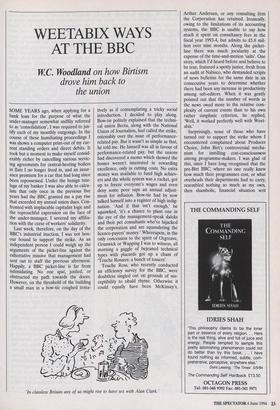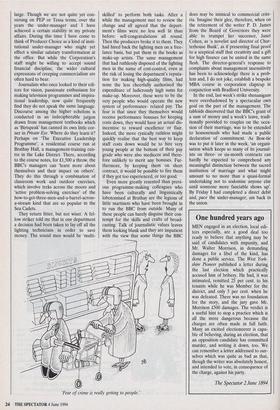WEETABIX WAYS AT THE BBC
W.C. Woodland on how Birtism W.C. Woodland on how Birtism
drove him back to the union
SOME YEARS ago, when applying for a bank loan for the purpose of what the under-manager somewhat sniffily referred to as 'consolidation', I was required to jus- tify each of my monthly outgoings. In the course of these humiliating proceedings I was shown a computer print-out of my cur- rent standing orders and direct debits. It took but a moment to make myself consid- erably richer by cancelling various servic- ing agreements for central-heating boilers in flats I no longer lived in, and an insur- ance premium for a car that had long since been repossessed. Under the benign tute- lage of my banker I was also able to calcu- late that only once in the previous five years had the BBC granted me a pay rise that exceeded my annual union dues. Con- fronted with implacable capitalist logic and the reproachful expression on the face of the under-manager, I severed my affilia- tion with the curse of workers' solidarity.
Last week, therefore, on the day of the BBC's industrial inaction, I was not hon- our bound to support the strike. As an independent person I could weigh up the arguments of the picket-line against the exhortative missive that management had sent out to staff the previous afternoon. Happily, a BBC picket-line is far from intimidating. No one spat, jostled, or obstructed my path towards the doors. However, on the threshold of the building a small man in a bow-tie coughed tenta- tively as if contemplating a tricky social introduction. I decided to play along. Bow-tie politely explained that the techni- cal union Bectu, along with the National Union of Journalists, had called the strike, ostensibly over the issue of performance- related pay. But it wasn't as simple as that, he told me. He himself was all in favour of performance-related pay, but the unions had discovered a memo which showed the bosses weren't interested in rewarding excellence, only in cutting costs. No extra money was available to fund high achiev- ers and the whole system was a racket, got up to freeze everyone's wages and even deny some poor saps an annual adjust- ment for inflation. Bow-tie had by now talked himself into a register of high indig- nation. 'And if that isn't enough,' he squawked, 'it's a chance to plant one in the eye of the management-speak daleks and their pet consultants who've hijacked the corporation and are squandering the licence-payers' money.' Whereupon, in the only concession to the spirit of Orgreave, Grunwick or Wapping I was to witness, all morning a gaggle of bejeaned technical types with placards got up a chant of `Touche Rossers: a bunch of tossers'.
Touche Ross, who recently conducted an efficiency survey for the BBC, were doubtless singled out on grounds of sus- ceptibility to ribald rhyme. Otherwise it could equally have been McKinsey's, 'In classless Britain any of us might rise to have sex with Alan Clark.' Arthur Andersen, or any consulting firm the Corporation has retained. Ironically, owing to the limitations of its accounting systems, the BBC is unable to say how much it spent on consultancy fees in the fiscal year 1993-4, but admits to £5.8 mil- lion over nine months. Along the picket- line there was much jocularity at the expense of the time-and-motion 'salts'. One story, which I'd heard before and believe to be true, featured a spotty junior, fresh from an audit at Nabisco, who demanded scripts of news bulletins for the same date in six consecutive years to determine whether there had been any increase in productivity among sub-editors. When it was gently pointed out that the number of words in the news owed more to the relative com- plexity of current events than to his own rather simplistic criterion, he replied, `Well, it worked perfectly well with Weet- abix.'
Surprisingly, none of those who have turned out to support the strike whom I encountered complained about Producer Choice, John Birt's controversial mecha- nism for instilling cost-consciousness among programme-makers. I was glad of this, since I have long recognised that the pre-Birt BBC, where no one really knew how much their programmes cost, or what overheads their departments had to carry, resembled nothing so much as my own, then shambolic, financial situation writ large. Though we are not quite yet con- versing on PEP or Tessa terms, over the years the under-manager and I have achieved a certain stability in my private affairs. During this time I have come to think of Producer Choice as a kind of insti- tutional under-manager who might yet effect a similar salutary transformation at the office. But while the Corporation's staff might be willing to accept sound financial discipline, the wider cultural expressions of creeping commercialism are often hard to bear.
Journalists who once looked to their edi- tors for vision, passionate enthusiasm for making television programmes and inspira- tional leadership, now quite frequently find they do not speak the same language. Discourse among the higher echelons is conducted in an indecipherable jargon drawn from management textbooks which as 'Birtspeak' has canned its own little cor- ner in Private Eye. Where do they learn it? Perhaps on 'The Executive Leadership Programme', a residential course run at Brathay Hall, a management-training cen- tre in the Lake District. There, according to the course notes, for £1,500 a throw, the BBC's managers can 'learn more about themselves and their impact on others'. They do this through a combination of classroom work and outdoor exercises, which involve treks across the moors and `active problem-solving exercises' of the how-to-get-three-men-and-a-barrel-across- a-stream kind that are so popular in the Sea Cadets.
They return fitter, but not wiser. A fel- low striker told me that in one department a decision had been taken to lay off all the lighting technicians in order to save money. The sound men would be 'multi- skilled' to perform both tasks. After a while the management met to review the change and all agreed that the depart- ment's films were no less well lit than before: self-congratulations all round. Then the producers broke it to them. They had hired back the lighting men on a free- lance basis, but put them in the books as make-up artists. The same management that had ruthlessly disposed of the lighting men in the name of cost-control, even at the risk of losing the department's reputa- tion for making high-quality films, had none the less cheerfully authorised the expenditure of ludicrously high sums for make-up. Moreover, these were to be the very people who would operate the new system of performance- related pay. The fear is that since they themselves would receive performance bonuses for keeping costs down, they would have an actual dis- incentive to reward excellence or flair. Indeed, the more cynically ruthless might quickly realise that the best way to keep staff costs down would be to hire very young people at the bottom of their pay grade who were also mediocre and there- fore unlikely to merit any bonuses. Fur- thermore, by keeping them on short contract, it would be possible to fire them if they got too experienced, or too good.
Even more greatly resented than previ- ous programme-making colleagues who have been culturally and linguistically lobotomised at Brathay are the legions of little martinets who have been brought in to run the BBC from outside. Many of these people can barely disguise their con- tempt for the skills and crafts of broad- casting. Talk of journalistic values leaves them looking blank and they are impatient with the view that some things the BBC `Fear of crime is really getting to people.' does may be inimical to commercial crite- ria. Imagine their glee, therefore, when on the retirement of the writer P. D. James from the Board of Governors they were able to trumpet her successor, Janet Cohen, as 'a novelist and director of Char- terhouse Bank', as if presenting final proof to a sceptical staff that creativity and a gift for high finance can be united in the same flesh. The director-general's response to complaints about management insensitivity has been to acknowledge there is a prob- lem and, I do not joke, establish a bespoke MBA course in corporation claptrap in conjunction with Bradford University.
In the end, last week's strike shenanigans were overshadowed by a spectacular own goal on the part of the management. The tabloids discovered that the BBC's grant of a sum of money and a week's leave, tradi- tionally provided to couples on the occa- sion of their marriage, was to be extended to homosexuals who had made a public declaration of commitment. As Bow-tie was to put it later in the week, 'an organi- sation which keeps so many of its journal- ists on three- or six-month contracts can hardly be expected to comprehend any meaningful distinction between the sacred institution of marriage and what might amount to no more than a quasi-formal undertaking not to sodomise anyone else until someone more fanciable shows up'. By Friday I had completed a direct debit and, pace the under-manager, am back in the union.



























































 Previous page
Previous page